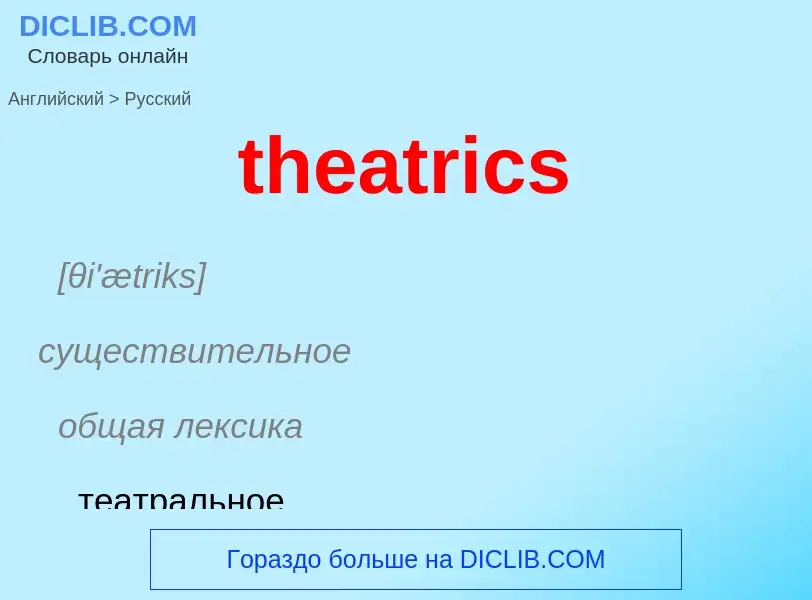Translation and analysis of words by ChatGPT artificial intelligence
On this page you can get a detailed analysis of a word or phrase, produced by the best artificial intelligence technology to date:
- how the word is used
- frequency of use
- it is used more often in oral or written speech
- word translation options
- usage examples (several phrases with translation)
- etymology
Goethe's ‹Dryden's› theatre - translation to
[θi'ætriks]
существительное
общая лексика
театральное
сценическое искусство
искусство театра
употр. с гл. во мн. ч. ломание
манерничание
['θiətə]
общая лексика
сценический
строительное дело
театр
синоним
Definition
Wikipedia

"Prometheus" is a poem by Johann Wolfgang von Goethe, in which the character of the mythic Prometheus addresses God (as Zeus) in misotheist accusation and defiance. The poem was written between 1772 and 1774 and first published in 1789 after an anonymous and unauthorised publication in 1785 by Friedrich Heinrich Jacobi. It is an important work of the Sturm und Drang movement.
In early editions of the Collected Works it appeared in Volume II of Goethe's poems in a section of Vermischte Gedichte (assorted poems), shortly following the "Gesang der Geister über den Wassern", and the Harzreise im Winter. It is immediately followed by "Ganymed", and the two poems together should be understood as a pair. Both belong to the period 1770–1775. Prometheus (1774) was planned as a drama but not completed, but this poem draws upon it. Prometheus is the creative and rebellious spirit which, rejected by God, angrily defies him and asserts itself; Ganymede is the boyish self which is adored and seduced by God. One is the lone defiant, the other the yielding acolyte. As the humanist poet, Goethe presents both identities as aspects or forms of the human condition.
Although the setting is classical, the address to the Biblical God is suggested by the section beginning "Da ich ein Kind war..." ("When I was a child"): the use of Da is distinctive, and by it Goethe evokes the Lutheran translation of Saint Paul's First Epistle to the Corinthians, 13:11: "Da ich ein Kind war, da redete ich wie ein Kind..." ("When I was a child, I spoke as a child, I understood as a child, I thought as a child: but when I became a man, I put away childish things"). Unlike Paul, Goethe's Prometheus grew up to disbelieve in the divine heart moved to pity for the afflicted. Prometheus's reference to making man in his image draws ironically, and strongly, on Luther's translation of the words of God in Genesis 1:26 ("Laßt uns Menschen machen, ein Bild, das uns gleich sei").
The poem was set to music by J. F. Reichardt, Franz Schubert (see "Prometheus", 1819), Hugo Wolf (1889) and F.M. Einheit (1993).




![[[Theatre Royal, Drury Lane]], London, c. 1821 [[Theatre Royal, Drury Lane]], London, c. 1821](https://commons.wikimedia.org/wiki/Special:FilePath/Cruikshank Pierce' Egan's Real Life - Drury Lane Theatre 1821.jpg?width=200)
![India]] India]]](https://commons.wikimedia.org/wiki/Special:FilePath/Demon Yakshagana.jpg?width=200)

![Cats]]'' at the [[London Palladium]] Cats]]'' at the [[London Palladium]]](https://commons.wikimedia.org/wiki/Special:FilePath/Palladium Theatre (16427934069).jpg?width=200)
![Interior of the [[Teatro Colón]], a modern theatre Interior of the [[Teatro Colón]], a modern theatre](https://commons.wikimedia.org/wiki/Special:FilePath/Panorámica interior del Teatro Colón (cropped).jpg?width=200)
![Greek]] [[phlyax play]], circa 350/340 BCE Greek]] [[phlyax play]], circa 350/340 BCE](https://commons.wikimedia.org/wiki/Special:FilePath/Phlyax scene Louvre CA7249.jpg?width=200)

![Rama and Shinta in [[Wayang Wong]] performance near [[Prambanan]] temple complex Rama and Shinta in [[Wayang Wong]] performance near [[Prambanan]] temple complex](https://commons.wikimedia.org/wiki/Special:FilePath/Ramawijaya dan Shinta pada Sendratari Ramayana Prambanan.jpg?width=200)
![Theatrical masks of Tragedy and Comedy. Mosaic, [[Roman art]]work, 2nd century CE. [[Capitoline Museums]], Rome Theatrical masks of Tragedy and Comedy. Mosaic, [[Roman art]]work, 2nd century CE. [[Capitoline Museums]], Rome](https://commons.wikimedia.org/wiki/Special:FilePath/Roman masks.png?width=200)
![Statues of [[Pantalone]] and [[Harlequin]], two stock characters from the ''[[Commedia dell'arte]]'', in the [[Museo Teatrale alla Scala]], Milan, Italy Statues of [[Pantalone]] and [[Harlequin]], two stock characters from the ''[[Commedia dell'arte]]'', in the [[Museo Teatrale alla Scala]], Milan, Italy](https://commons.wikimedia.org/wiki/Special:FilePath/Statue in legno e porcellana coi personaggi della commedia dell'arte, 01 pantalone e arlecchino.jpg?width=200)
![Greek]] theatre in [[Taormina]], [[Sicily]], Italy Greek]] theatre in [[Taormina]], [[Sicily]], Italy](https://commons.wikimedia.org/wiki/Special:FilePath/Taormina BW 2012-10-05 16-05-05.jpg?width=200)

![A theatre stage building in the backstage of [[Vienna State Opera]] A theatre stage building in the backstage of [[Vienna State Opera]]](https://commons.wikimedia.org/wiki/Special:FilePath/Vienna - Vienna Opera Backstage - 9729.jpg?width=200)
![The rotating auditorium of the open air [[Pyynikki Summer Theatre]] in [[Tampere]], [[Finland]] The rotating auditorium of the open air [[Pyynikki Summer Theatre]] in [[Tampere]], [[Finland]]](https://commons.wikimedia.org/wiki/Special:FilePath/Yokatsomo.jpg?width=200)
![Sanskrit theatre]] Sanskrit theatre]]](https://commons.wikimedia.org/wiki/Special:FilePath/കൂടിയാട്ടത്തിലെസുഗ്രീവൻ.jpg?width=200)
